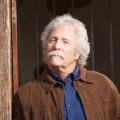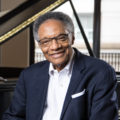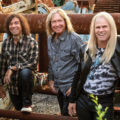Nitty Gritty Dirt Band’s John McEuen mounts a multi-media “Circle” show, 50th birthday book
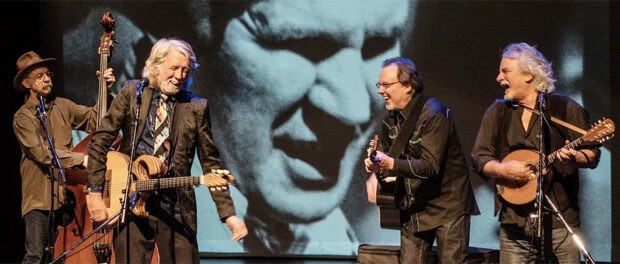 Photos provided by John McEuen
Photos provided by John McEuen
Flying high from grassroots momentum in the 1960s and the strength of the now iconic single “Mr. Bojangles” when the decade changed over, country trailblazers the Nitty Gritty Dirt Band soon changed lanes to fully revisit its folk and bluegrass origins.
It was exactly 50 years ago when the group’s collaborative collection, “Will The Circle Be Unbroken,” was unleashed on unsuspecting ears, perhaps singlehandedly introducing the traditional likes of legends Mother Maybelle Carter, Earl Scruggs, Roy Acuff, Doc Watson, Merle Travis and Jimmy Martin to the hippie generation.
Group co-founder John McEuen was the one who got the ball rolling, and now, he’s not only telling the whole story in a photo book of the same name, but also staging a multi-media show anchored around an album that went on to sell over a million copies, spawn two sequels, plus land in both the Library of Congress and the Grammy Hall of Fame.
Chicago Concert Reviews rang the man many label the “String Wizard” for a sample of what to expect at Milwaukee’s Shank Hall on Thursday, November 3 and Chicago’s Old Town School Of Folk Music on Friday, November 4, plus insights on getting covered by Garth Brooks, a friendship with fellow banjo man Steve Martin and where his primary genre stands today.
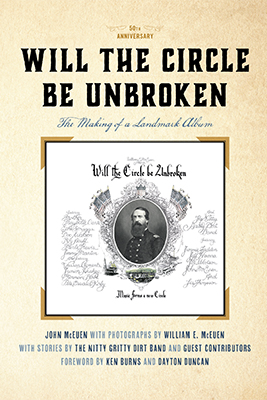 In your opinion, what’s led to this landmark album’s ability to last for 50 years?
In your opinion, what’s led to this landmark album’s ability to last for 50 years?
John McEuen: It’s as close to being just real music as you can get. Maybelle Carter has a song and she sings it. It’s that simple. Other people join in and back her up. Merle Travis was a simple man that wrote very complicated music. Doc Watson was a wonderful player. He couldn’t read music. He was blind. He approaches it from a different angle. He plays things from the heart that he likes. Bashful Brother Oswald, the dobro player, couldn’t read or write, but it didn’t matter. What he played came from his soul…
None of these people were professional musicians in the sense that they had music writing or reading experience. Vassar Clements, this one time I was recording him a couple years after the “Circle” album, I put a music chart on his stand and he looks at it and says, “what’s that for?” “That’s the charts if you need to follow the song.” He looks at it, turns it upside down and says, “that’s better” (laughs). He couldn’t follow a chart. He played with his eyes shut. He was from a different planet. It’s a different world of people we were recording with and it was fun to relate to them in the way that they were with each other. That’s what I try to bring to the stage.
How did you go about tracking down that whole generation of players and getting the project off the ground?
McEuen: It was magical. I asked Earl Scruggs when he was playing a club in Colorado. “Would you consider recording with the Nitty Gritty Dirt Band?” And he said, “I’d be proud to.” A week later, Doc Watson was playing the same club. “Hi Doc, we’re making an album with Earl Scruggs.” We weren’t making an album. He just said, “I’d be proud to.” You have to [get ahead of yourself sometimes]. In my mind, we were making an album and I told my brother, Bill McEuen, who managed and produced the group. Bill got Merle Travis, then we asked Earle to get Maybelle Carter and she said, “yes.” Then we asked him to get Jimmy Martin and he said, “yes.” Then Bill and I told the Dirt Band three weeks into that what was coming up…
My brother and I told the record company about this album we wanted to make, an acoustic, two-track bluegrass traditional music album. The record company president listened for a half hour, and at the end he said, “I don’t think I’ll sell ten of these, but you have a lot of passion for this. I’ll put up 22 thousand dollars.” That’s all the budget we had, which is not very much when you consider the [price of tapes], hotel rooms, transportation, paying the musicians, eating food for the week, flying a couple people out there and paying everybody (laughs).
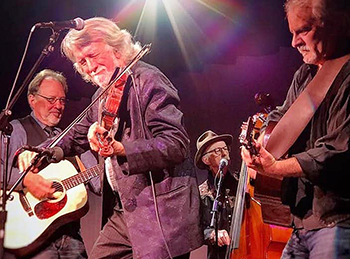 Well, it worked out. One of the session sheets has ten songs on it, which is amazing. The thing is when we were done, you’d go in, listen to make sure you got the sounds right and you’d be finished. It was like a celebration. “Alright, what one should we do next?” We would do the next one and that would take very limited time… A magic moment was when I recorded “Soldier’s Joy” with Earl Scruggs. We played it one time. I said, “well, that was good Earl. You want to do it again?” He said, “I don’t reckon why? Did I make a mistake?” I said, “no.” “Well, did you?” I said, “no.” “Well, why should we do it again?” (laughs). I said, “because I don’t get you in my band very often” (laughs). We recorded for five days and did 38 songs!
Well, it worked out. One of the session sheets has ten songs on it, which is amazing. The thing is when we were done, you’d go in, listen to make sure you got the sounds right and you’d be finished. It was like a celebration. “Alright, what one should we do next?” We would do the next one and that would take very limited time… A magic moment was when I recorded “Soldier’s Joy” with Earl Scruggs. We played it one time. I said, “well, that was good Earl. You want to do it again?” He said, “I don’t reckon why? Did I make a mistake?” I said, “no.” “Well, did you?” I said, “no.” “Well, why should we do it again?” (laughs). I said, “because I don’t get you in my band very often” (laughs). We recorded for five days and did 38 songs!
What would you say to the record label executive now that it’s lasted for so long?
McEuen: Thank you. He’s dead, but he was real big in the publishing business and told me in 2004 before he died, “John, I’ve got three records on my wall in my office here, the records that I’m especially proud of that I helped get made. One is Tina Turner’s first album, one is John Lennon’s first album and one is the ‘Circle’ album. There’s a thousand others that I’ve made, but these are the ones that stand out to me…”
How would you describe the anniversary show that’s come out of that whole history?
McEuen: I use video and stills. My brother took a lot of photos of the Nitty Gritty Dirt Band in the early days and during the “Will The Circle Be Unbroken” album. I have a book that just came out about the 50th anniversary, and in the book, I wrote a story for every one of the 150 photographs. I got a bunch of people to contribute comments, like Gary Scruggs [Earl Scruggs’ son], Marty Stuart, the Dirt Band guys, some of the guys that did the cover design and just a bunch of people. I wrote the stories, put the book together and I’m basically taking this book on stage. Jodee Lewis is going to play the part of Maybelle Carter and Michael J. Miles is going to play some banjo and guitar. [Bassist/guitarist] Les Thompson, an original Dirt Band member, [will also be part of The Circle Band]. He’s the guy that called me in 1966 to see if I wanted to join a new band that was getting together, and I said, “well, I’ll give it a shot.” I did that for 50 years and then I left (laughs). I enlisted him about eight years ago. He’s really happy as a clam. And a new guy, Danny Knicely, is a really great guitar player from Virginia. It’s gonna be a really fun show where sometimes the screen talks and we end up playing to it. I mean Maybelle Carter says, “on that old record, I started it like this” and then I start the song live on stage as the pictures go by. We do the song that was being talked about. That’s not all it is though. It has to be seen. I love doing this show because every time it’s a little different.
 What are some guarantees everyone can look forward to hearing?
What are some guarantees everyone can look forward to hearing?
McEuen: Well, Jodee Lewis kills “Wreck On The Highway.” I can’t wait to hear her sing it and I’m gonna do “Keep On the Sunny Side” with her. Talking about Maybelle Carter, you can’t leave out “Keep On the Sunny Side” and “Will The Circle Be Unbroken.” Of course, leading up to that is “Some Of Shelly’s Blues,” “Mr. Bojangles” and the stories behind them. I can’t replicate the records on stage. I don’t have all the tricks of the studio, all the effects and everything, but I can tell you the story of the song and then play the version that we learned it from. In going back to the old days, there’s a demo on Kenny Loggins that I made when he was 18-years-old and I’ll have the audience sing along with part of that. They can say they sang with Kenny Loggins that night (laughs)…The music is bluegrass, country, traditional, some old timey Nitty Gritty Dirt Band, “Will The Circle Be Unbroken” music and some music from my “Made In Brooklyn” album, the most recent record I have out, which I’m very proud of.
Out of the many you mentioned, what has “Mr. Bojangles” meant to you and the countless others you’ve surely heard from?
McEuen: That’s a magic thing to have a song that reached people that deeply for that long. The song is in the Grammy Hall of Fame. [But the writer], Jerry Jeff Walker told me he was gonna quit the music business [right before] this was a hit. He said, “I was sitting in a rest area on 1-95 in Virginia. My buddy and I were heading to Florida. The music business hadn’t been good to me. The night before, the club I was playing had 20 people in it.” [I said,] “Jerry Jeff, we just recorded your song, ‘Mr. Bojangles.’” “Yeah, other people have done it. Nothing will happen. I’m quitting the music business.” Anyway, he was in a rest area, and at 5:30 in the morning, his traveling partner says, “hey Jerry, isn’t that your song on the radio?” “I cranked that thing up, pointed my car at Austin and never looked back.” It’s amazing how that story reached so many people. It reached Vietnam veterans. It reached hippies. It reached straight guys [meaning those who weren’t hippies]. I was just grateful it meant so much to so many and I love doing it.
What was it like to see Garth Brooks incorporate the Nitty Gritty Dirt Band’s “Fishin’ In The Dark” into his concerts on so many occasions?
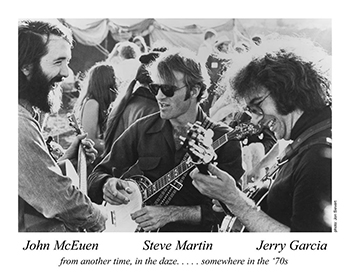 McEuen: Oh, that’s a neat thing when you feel like you’ve actually had an effect on somebody like that. Garth is a nice guy. Garth mentioned me in his linear notes one time. I was always proud of that.
McEuen: Oh, that’s a neat thing when you feel like you’ve actually had an effect on somebody like that. Garth is a nice guy. Garth mentioned me in his linear notes one time. I was always proud of that.
Another one of your familiar partnerships is with fellow banjo player Steve Martin. Tell us a bit about getting to know one another.
McEuen: Steve and I met when we were 16-years-old. We were both trying to get a job at the magic shop in Disneyland. We succeeded. It was a wonderful three years demonstrating and selling magic tricks. Every 20 minutes, you’d have a new audience [of varying sizes]. I sold 152 Svengali decks in one day. It’s a trick deck and that was a record. But in the middle of that, the banjo came along, and Steve and I started playing. I started showing him how to play things cause I understood it a little better. Then he started being funny and I got my brother to manage him. He managed him, produced his movies and albums for 20 years, and then moved on. I ended up producing Steve’s album he put out [a little over] ten years ago, “The Crow.” We won a Grammy with that, hooray, so that was a good association.
You’ve also hosted “The Acoustic Traveller Show” on XM radio for quite a while. What’s your vision for that program?
McEuen: They asked for it and I thought, “well, I could reach 200 to 400 thousand people every month. Why don’t I do that?” It’s been about 16 years and it’s really fun. I do a one-hour show that goes out and they run it six or seven times every month. I only play people that I’ve met or recorded with, [although] I haven’t met everybody I’ve recorded with. Anyway, there’s a few of those that have me given me their demo along my travels. I haven’t run out of people yet, from street performers in Canada, to a street performer in Santa Monica, California, to bands and musicians. A couple months ago, I played a cut that Leon Russell and I did just the two of us. Leon was a good friend. I knew him from 1966 and we ended up recording together a couple of times. Anyway, so there’s “The Acoustic Traveller Show.” Tune it in. It’s on The Village channel.
I imagine throughout more than a half-century in entertainment, there’s probably very few people you haven’t met.
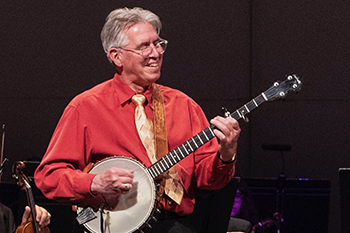 McEuen: I mean, there’s some and there’s some that I’ve wanted to record with, but I’ve [only] met them. I’ve always loved John Forgery’s voice, and when I met him a few years ago, I was really happy he had two of my solo albums. He even mentioned cuts (laughs). I ran into Paul McCartney in the ‘70s. “Oh yes, Nitty Gritty Dirt Band. Spencer Davis gave me that album about ‘Uncle Charlie & His Dog [Teddy].’” He’s talking about the album that had “Mr. Bojangles” on it. I thought that was really cool. I talked to him for a whole ten minutes, then he went to work. I saw him once [again] at the premiere of the movie “Ray” in L.A.
McEuen: I mean, there’s some and there’s some that I’ve wanted to record with, but I’ve [only] met them. I’ve always loved John Forgery’s voice, and when I met him a few years ago, I was really happy he had two of my solo albums. He even mentioned cuts (laughs). I ran into Paul McCartney in the ‘70s. “Oh yes, Nitty Gritty Dirt Band. Spencer Davis gave me that album about ‘Uncle Charlie & His Dog [Teddy].’” He’s talking about the album that had “Mr. Bojangles” on it. I thought that was really cool. I talked to him for a whole ten minutes, then he went to work. I saw him once [again] at the premiere of the movie “Ray” in L.A.
On the other hand, I taught Sissy Spacek how to play piano for that movie that Tommy Lee Jones directed [“The Good Old Boys”]. I wanted her to be able to play it live with the cameras. That took a month. Every day she’d come in and she did it. A simple little song and it was really cool. And there’s others, [such as “Father of Bluegrass”] Bill Monroe and [songwriter] Paul Williams, the “Rainy Days And Mondays” and “We’ve Only Just Begun” guy. I did a DVD on Paul Williams. He told me this was “the best thing I’ve got in my career that I’ve made. Thank you.” It was a five camera shoot called, “I’m Going Back There Someday,” [named after] one of his songs. I had him do it with Gonzo the Muppet. Boy that was a funny thing. It was really something to call the Henson Creature Shop and say, “I’d like to use Gonzo on a recording with Paul Williams.” “Oh Paul Williams, we love him,” cause he wrote a lot of Muppet music. Then I had him do “Rainbow Connection” with Willie Nelson and that was wonderful. I never understood the song. It seemed like it was a conversation between two people, so I had Willie and Paul switch back and forth. It really worked for me. I like to produce things.
You’ve always been active behind the scenes and solo even when you were with the band, but what made you decide to go completely on your own?
McEuen: The group didn’t work enough. From 2002 til 2017, the Nitty Gritty Dirt Band only did two albums. “We can’t do an album. One of the guys is a problem.” “Okay, well then, get rid of him. We’ll do an album.” “We’ll get rid of him.” “He’s been gone for three years now. Why don’t we do another record?” Finally, four or five years later, another record. And then their latest album, as an example, is “Dirt Does Dylan. It’s like all Bob Dylan songs…So in 20 years, they’ve done three albums. I did 11 film scores and seven or eight albums. Some were my own, but some of ‘em weren’t and I wrote two books (laughs). There’s only so much time here. We have to take advantage of all of it and do things if you’re able to do ‘em.
How do you feel about country music’s many changes and its status at the moment?
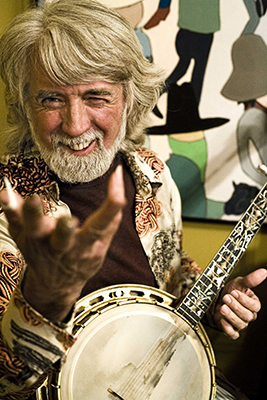 McEuen: Well, it’s always changed. Every ten years, it’s something’s different. I don’t like the current situation as much. Everything sounds much more alike than it used to. The musicians are quite often the same Wrecking Crew-type team of players and the songs are more factory driven. A lot of the artists, they don’t have the same background that Waylon Jennings or Johnny Cash or Kris Kristofferson had, you know? They got a cowboy hat, they worked at a bar and then they got on stage. And that’s okay. Some of ‘em sing good. Some of ‘em write good. Garth Brooks is a real good guy. He writes very clever songs and he performs great. Some of the performers are really good. I’m just saying in general. Hey, some of those older performers were kinda cranky too. They didn’t show up or they played a 15-minute set and left drunk. It wasn’t all good.
McEuen: Well, it’s always changed. Every ten years, it’s something’s different. I don’t like the current situation as much. Everything sounds much more alike than it used to. The musicians are quite often the same Wrecking Crew-type team of players and the songs are more factory driven. A lot of the artists, they don’t have the same background that Waylon Jennings or Johnny Cash or Kris Kristofferson had, you know? They got a cowboy hat, they worked at a bar and then they got on stage. And that’s okay. Some of ‘em sing good. Some of ‘em write good. Garth Brooks is a real good guy. He writes very clever songs and he performs great. Some of the performers are really good. I’m just saying in general. Hey, some of those older performers were kinda cranky too. They didn’t show up or they played a 15-minute set and left drunk. It wasn’t all good.
Anything else to add on the way to the Midwest?
McEuen: [Chicago’s own “Go Cubs Go” and “City Of New Orleans” singer/songwriter] Steve Goodman. Stevie Goodman was a good friend and was wonderful. I got him a job opening for Steve Martin. I told Steve Martin’s agent, “look, the only guy that can open for Steve Martin, don’t worry it’s not me Marty, it’s Steve Goodman.” Isn’t that perfect the agent’s name was Marty? Now he’s out with Martin Short. The Steve Martin Short show, like two Steves again. Steve Goodman did about 400 shows with Steve Martin and killed it every time.
Anyway, the Old Town School Of Folk Music has very nice people who are very dedicated. A couple of the colleges around there have been nice. Jodee Lewis is a great singer and Michael J. Miles is a great guy, so I like the fact they’re going to play this show with me. Tell people if you’re coming to the show to bring a question. Sometimes I [ask if anybody has any] two or three times, and by the third time, somebody [finally asks something], then after the show, usually there are 50 questions! I say, “why didn’t you ask that during the show?” That’s a fun thing. It always takes it to a different place.
John McEuen & The Circle Band with Jodee Lewis and Michael J. Miles perform at Shank Hall in Milwaukee on Thursday, November 3 and the Old Town School Of Folk Music on Friday November 4. For additional details, visit JohnMcEuen.com, ShankHall.com and OldTownSchool.org/Concerts.


